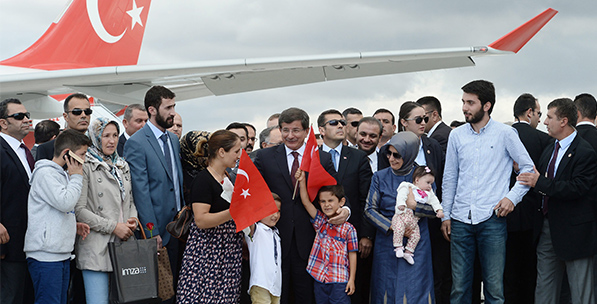The World's Pivot to Asia
Tensions in the Asia-Pacific region and the absence of effective mechanisms to resolve the differences among the actors, demonstrates that there is always a danger that tensions will escalate and to turn into a major crisis.
More


The New Regional Order and Turkey
Discursive criticisms targeting Turkey since day one of the uprisings in the Middle East may be categorized under three headings: Discourses claiming that Turkey acts ideological, the discourse of precious loneliness, and the irrationality discourse.
More
As long as the AK Party remains in charge of Turkish foreign policy, the national conversation pertaining to these issues will remain ideologically charged.
If anyone actually thought that the Arab revolts, the most recent wave of change in the Middle East, would allow Iran and Israel to put pressure on the region, though, time has proved them wrong.
It is quite ironic that a supposedly pro-Western opposition seeks to undermine the possibility of Turkey's critical integration into the West.
The Western media sees Kobani as a symbol that will trigger an armed fight for democracy, as it did in the Arab Spring, which puts it to the fore.
How to Abolish the Board of Higher Education
The coming months will provide ample opportunity to examine and learn how competing political parties are planning to tackle the seemingly challenging task of higher education reform in Turkey.
More


Energy Supply Security and the Southern Gas Corridor
This analysis focuses on the concept of energy supply security and SGC project that have been developed to provide energy supply security with Turkmenistan, Iran, KRG, and the East Mediterranean.
More
The Kurdish political movements in both Syria and Turkey should give up being pragmatists in order to have pragmatic gains. The Kurdish political movements should also give up being opportunists in order to benefit from the opportunities in the region.
Forty-nine hostages were rescued from ISIS after a successful operation. Considering the delicacy of the situation, the supervision and conduct of this operation appear worthy of commendation.
First and foremost, the Abadi government will have to accumulate enough power to discourage Sunni tribes from joining ISIS fighters. The main question remains: what will happen once ISIS is defeated?
How has the course of history in the US-Iranian relations been? What are the needs of the parties so that they have an urge for a rapprochement? What are the possible implications of a possible rapprochement with regard to the parties, the region and Turkey?
It is becoming increasingly clear with every international crisis that the world order is moving towards a more balanced and multipolar structure in which a multiplicity of actors are holding numerous instruments of influence against each other.
What really is the so-called Islamic world? How accurate is it to describe a group of Muslim countries, incapable of taking charge of their future and resolving their own issues, as the Islamic world?
Concerted action against repeated and unlawful aggression on the part of Israel, which behaves like an "anachronic colonial state," should start from demystification of its endless power perception and alleviation of various fears in the Muslim world.
A successful transition in Iraq towards stability will require meangingful decentralisation, an equitable plan for oil revenue distribution - and a lot of compromise on all sides.
Unlike in the aftermath of World War I, none but the Middle East's own children are to blame for the turmoil that the region experiences today.
The turbulent and unstable state of the Middle East invites us to reconsider every possible option in order to reach longstanding stability and cooperation.
No need to say that this will create a substantial additional bill for energy-dependent countries like Turkey, and multi-pronged strategies shall be prepared beforehand to ensure energy security.
The regional actors are roughly divided into two camps. All regional administrations, except Turkey, are fighting over each other to extend the life of the Sykes-Picot order.
















